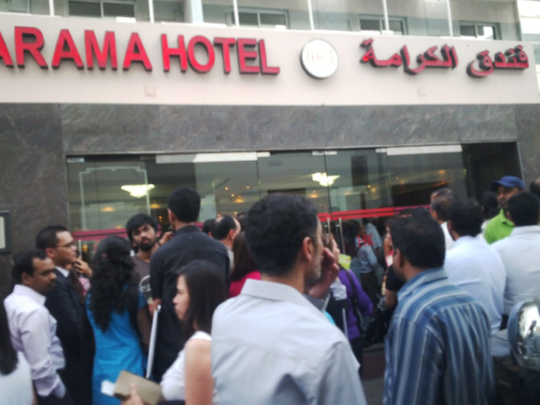
Dubai: Armed with invoices and passbooks, hundreds of worried investors thronged a city hotel on Wednesday evening in the fervent hope of recovering their lost millions from a shady Indian outsourcing company shut down by the Department of Economic Development (DED) last fortnight.
Torn between hope and despair, the investors had set up a ‘reconciliation meeting’ with representatives of Sunfeast Infotech at the Karama Hotel. It was supposed to be a marathon 5 to 10pm meeting but ended abruptly and without any discernible solution.
Scores left with broken hearts. Among them was an eight-month pregnant Filipina who had kept aside Dh15,000 for her delivery, a Pakistani security guard (Dh16,000) who had come all the way from Abu Dhabi, an Indian businessman (Dh200,000) who borrowed from friends and loan sharks and a suicidal Sri Lankan executive (Dh50,000) who was lured into the scheme by a friend.
“Assurances, assurances and more assurances. This time they sought six days time. Apparently, we need to go to their Al Ghusais office and register for the refund.
“We were told that Sunfeast’s Chennai and London offices will pump in millions of dollars to repay us. I don’t believe that. I guess they are buying time,” said an angry Filipina sales girl. She had forked out Dh6,000 she had saved over three years.
A Palestinian who lost Dh55,000 said: “The only way they could return our money is by roping in more investors. That’s not happening now. If I don’t get my money back, I will take them to court.”
But not all investors want to take legal recourse. “UAE laws do not allow us to take these outsourcing jobs. I could be in bigger trouble for reporting them. So I would rather settle it out of court,” said an Indian with a Dh30,000 investment. “Initially, I thought they were genuine, but not anymore,” he added.
A Filipino IT executive said: “I got a bonus from my boss recently and added my own savings to invest Dh30,000. I don’t think I am getting it back.”
But there was some optimism too. “Let us give them some time to get their house in order,” said an Indian. “So what if their accounts have frozen. Their representative told us they have enough money in their Dubai office to pay us all back, The firm owners won’t be released until they pay. So our money is safe,” he added.
On the ground, though, nothing much has changed since XPRESS first reported the Ponzi-like scam last week.
Both Sunfeast owners are still in jail, their offices remain shut and the fate of their 6,000 investors continues to hang in delicate balance, even as more sordid details emerge each passing day.
It has now come to light that their offices even had credit card machines for those who didn’t have cash. “The set-up looked so fancy we fell for it,” said a Palestinian. A woman said that only seven of the 20 jobs she had taken were genuine. “The rest had bogus addresses or were repeats.”
The DED which sealed Sunfeast’s offices following a raid on April 29 declined to comment on the issue, saying “the matter is now pending with other authorities.” But Dubai Police confirmed that the prosecution is investigating the case, adding that the firm owners could be charged with scamming people, hiring employees without a licence and sexual assault among other things.
“It looks like a typical Ponzi scheme, where money brought in by new investors is used to pay off the old ones. It looks good only till it lasts but when the cycle of fund inflow is disrupted the whole things falls apart like a pack of cards. This is precisely what seemed to have happened here,” said a lawyer familiar with such cases.
With inputs from Jay B. Hilotin and Abhishek Sengupta
The story so far
2012: Sunfeast Infotech opens office offering attractive returns on home-based typing jobs. Against a Dh500 security deposit, customers are given flash drives with manuscripts in PDF format which they are required to type into text format and submit within 25 days. At the end of a 30 day cycle, they are paid Dh250 for the job. In theory, they get their initial investment in two months; any extra job after that is profit.
Early 2013: Enticed by big returns, thousands sign up with Sunfeast, some taking hundreds of ‘projects’ at the same time. Many outsource the typing jobs back to their home countries.
April 29: DED cracks down on Sunfeast’s offices and their owners are jailed on criminal charges, but the firm plays down the incident, saying it’s a minor issue that will be addressed soon.
May 7: XRESS reports how 6,000 families have been hit by the scam even as Sunfeast again assures investors that their offices would reopen on May 15, 2013 and that the company owners will be released in a day or two.
May 15:: Sunfeast’s office remains shut, their owners are denied bail and a much awaited meeting between investors and company representatives at the Karama Hotel remains inconclusive.
Similarities between Sunfeast’s outsourced jobs and a Ponzi scheme
Sunfeast insists it’s a genuine company with a viable business model. We leave it to the readers and jittery investors to decide
Ponzi scheme
1. A ponzi scheme is an investment scam where investors are promised, and seemingly delivered, unusually high rates of return.
2. In a ponzi scheme, scam artists pool funds received from victims, living off some and paying a portion back to the investors as interest or gains.
3. The scam artist supplies the victim with documentation or account statements making it appear as if their investment is still intact and earning an exceptional rate of return.
4. Blinded by the returns, investors sink in more money as well as publicise this great investment to their friends and other potential investors.
5. When investors request refund plus earnings, scam artists reach a point where they cannot collect enough new money to pay off the old investors. The scheme collapses and the authorities become involved.
Sunfeast model
1. Sunfeast promised and gave unusually high returns for simple data entry jobs – something a fifth grader who knows how to type on a computer can do.
2. Sunfeast used funds from investors to expand their business (they opened their second office in Dubai in less than two years) and paid back initial investors.
3. Sunfeast issued passbooks to investors, assuring them their investments were safe, but never came out in the open about the clients who they were outsourcing jobs for.
4. Many victims XPRESS spoke to confirmed they were enticed to join Sunfeast after seeing high returns of their friends and neighbours.
5. Sunfeast job outsourcing scheme roped in thousands of investors in no time. It collapsed as quickly when some investors demanded a refund of their security plus their earnings and contacted authorities.














